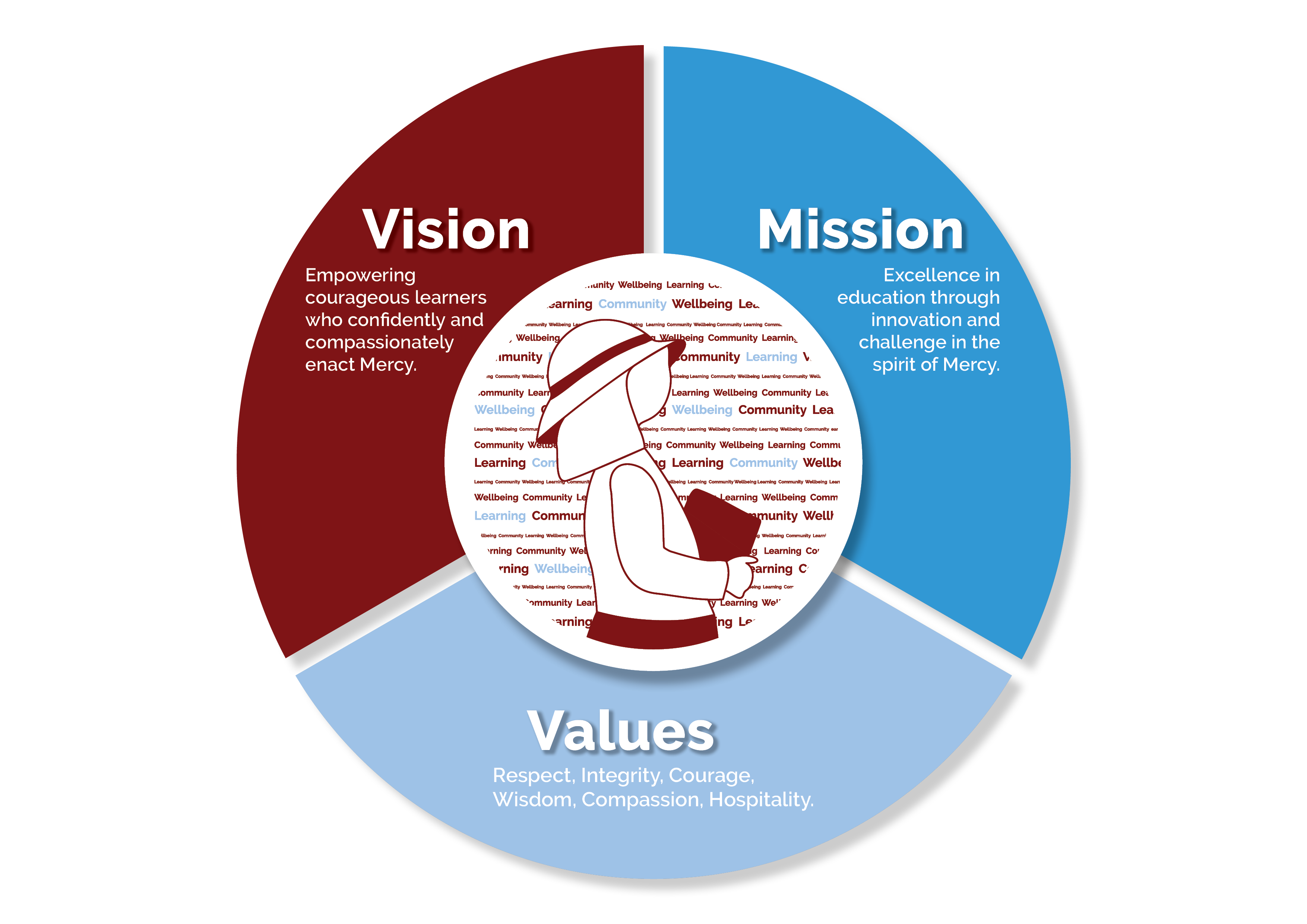
Vision
Empowering courageous learners who confidently and compassionately enact Mercy.
Mission
Excellence in education through innovation and challenge in the spirit of Mercy.
Values
Respect "Our mutual respect and charity is to be 'cordial' - now cordial signifies something that revives, invigorates, and warms", says Catherine McAuley. While Catherine's language may seem dated, her meaning is clear. Respect and love, or charity, are two sides of the one coin. They must come from the heart. Our respect and love for each other is to be reciprocal, not one-sided. The end result of mutual respect and love is life (it revives), strength (it invigorates) and warmth.
Integrity - We demonstrate integrity when we have the strength to do what is right, are honest and trustworthy in our dealings with others and are true to our Catholic values. In the face of opposition, Catherine exemplified the quality of integrity in her pursuit of justice for poor women and children. This led her to open the house of Mercy on Baggot St. She met resistance from the homeowners on Baggot Street as well as some clergy. Catherine's persistence and integrity in seeking justice for the poor led her to found a congregation that today is present in forty-four countries and six continents.
Courage defines the action of the first sister to come to Ipswich as they followed Catherine's example. Ipswich was a new and, at the time, relatively remote place. In her Familiar Instructions, Catherine McAuley says of courage: "Should we not then undertake our duties with great courage, for infinite is the love God has for those who repose in (God's) protection?" Shortly before her death, she advised her founding companion, Mary Anne Doyle: 'Speak as your mind directs, and always act with courage" (Letter of July 1841). For Catherine, courage is the gift of the God in whom we trust.
Wisdom - While she was dying, Catherine reminded one of the sisters sitting by her bedside to care for those sisters who had come to be with her in her last hours. Catherine said, "Get a good cup of tea... when I am gone, comfort one another." This was tremendous wisdom in Catherine McAuley's final words. She knew the value of stopping to reflect on life and death and all that encompasses those realities. Sitting and having a cup of tea with someone who is lonely or sad or stressed is an act of mercy. Having a conversation with someone with whom you disagree is a powerful statement about the ability of human beings to live with differences with graciousness. Wisdom demands reflection and discernment before acting.
Compassion was evident by the Sisters, in listening to the requests of the Ipswich community and heeding their call for a Catholic education for their children. In her Familiar Instructions, Catherine McAuley speaks of "things (that are) prized more highly than gold." She lists "the kid word, the gentle compassionate look and the patient hearing of their sorrows." When Catherine penned these words, she was surely describing her own way of life. The gentle compassionate look came from a heart that was charged with the mercy of God.
is central to the Mercy charism. Hospitality is about opening one's home and heart to those who need a place to belong. The construction and opening if a house of hospitality for the poor of early 19th century Dublin marked the beginning of a Mercy movement that spans the globe and has touched the hearts of countless women, men, and children for almost two centuries. Catherine McAuley was bequeathed a substantial inheritance from Mr and Mrs Callaghan whom she worked and cared for. Rather than keep the money for herself, Catherine was able to realise her long-held dream of providing a home for young women at risk.
We trust that these values live the legacy of Catherine McAuley and call Alumnae and current students alike to be Women of Mercy.
© Brisbane Catholic Education, St Mary's College 2024